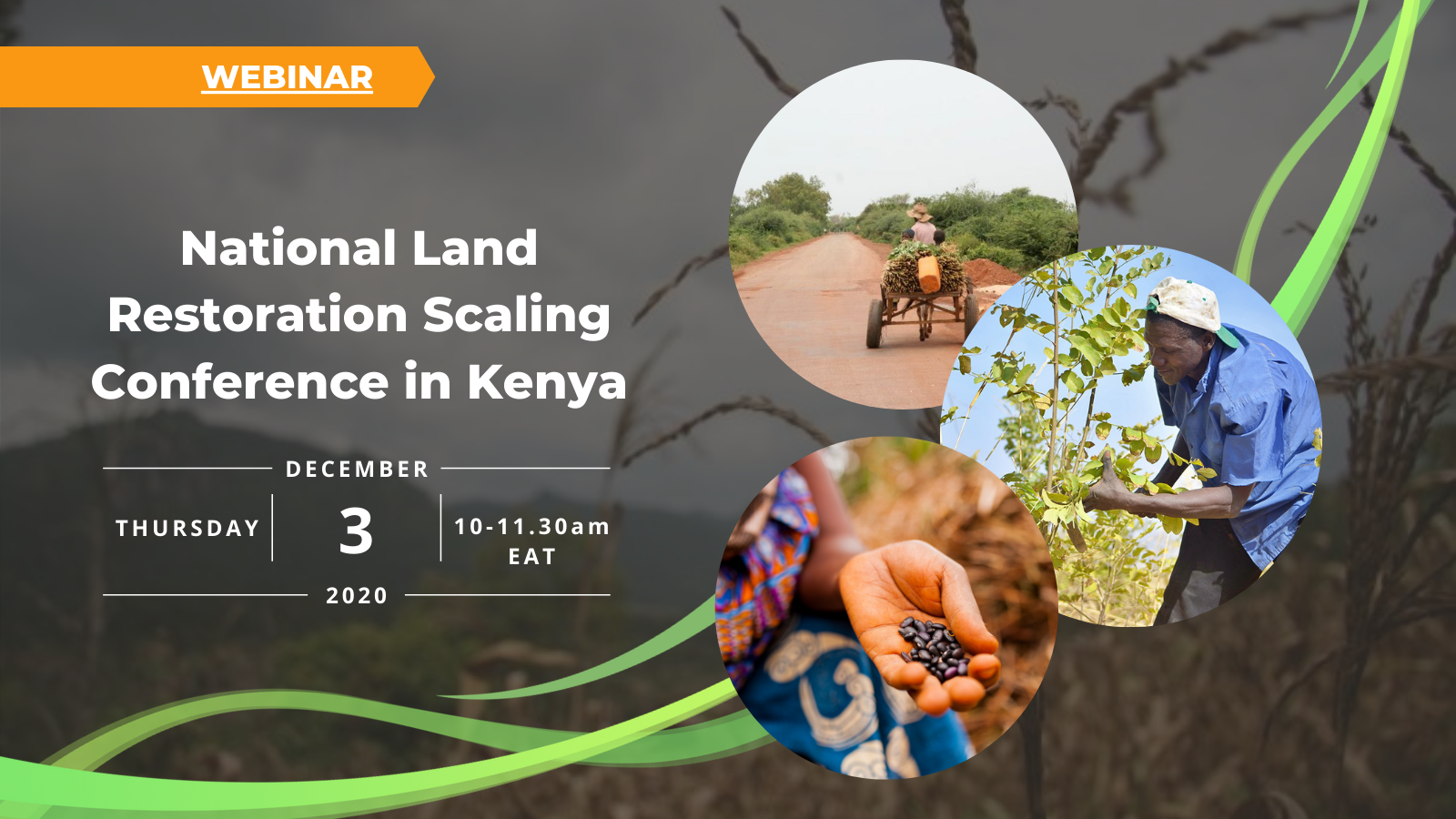
Kenya has made major commitments to international agreements on land restoration, climate change, and biodiversity, because there is widespread appreciation among the leadership and citizenry that it is important to address these challenges.
Land restoration can reverse the degradation processes on farmlands, communal grazing lands, and forestlands, and it has become the focus of major attention. Farmer-managed natural regeneration (FMNR) and other tree-based land management practices, such as: agroforestry, soil and water conservation, sylvo-pasture systems, and others are making important contributions to regeneration. In addition, traditional systems of grazing land management, paddocks and rotation grazing, reseeding of grasslands are critical for maintaining a healthy herd and restoring degraded pasture lands.
There are numerous efforts being undertaken, including in the environment, forestry, grazing management, conservation and agriculture spaces towards restoration in the country. They are being spearheaded by multiple stakeholders. But many of these efforts remain fragmented and could benefit greatly from pursuing greater synergies. This conference will help highlight best practices, identify gaps, opportunities for policy adjustments and help rally critical stakeholders to work together to help the country towards achieving its ambitious goals.
This conference will focus on accelerating the momentum of land restoration in Kenya by highlighting different innovative land restoration practices that are suitable for different ecological and social contexts. Through reflecting upon and celebrating the contribution of natural regeneration and other methods to restoration outcomes, opportunities to further scale-up these values of regeneration for restoration will be identified.
Conference Objectives:
- To work together with the Government of Kenya to realize the restoration commitments of 5.1 million hectares under AFR 100 and the 10% tree cover on farms.
- To showcase different restoration practices beyond tree planting and their suitability for the different agro-ecological zones that are present in Kenya.
- To identify opportunities and amplify and scale-up restoration efforts
- To bring together stakeholders working in the restoration space to develop a common roadmap including contributing to the restoration portal being led by KEFRI.
- To catalyse a national restoration movement that can shape mindsets and active implementation.
- To develop a platform for engaging with policy makers that will contribute to necessary policy adjustments.
- To catalyse funding for land restoration in the country towards realizing the vision of the UN Decade for Ecosystem Restoration (2021-2030).
- Establish a national restoration committee that identifies and rewards successful restoration initiatives and community champions at the national level on an annual basis.
- To work together towards a join national monitoring taskforce comprised of government technical services, ICRAF-CIFOR, FAO, WRI and other institutions with capacity to provide support in developing monitoring frameworks and tools.
The Conference will take place in the middle of 2021 with a series of online presentations, discussions, and breakout sessions around key thematic areas leading up to the main conference event.
Setting the stage for this conference will be a series of thematic webinars, the first scheduled to take place on 3rd December 2020, 10 – 11:30 am EAT.
Please join us in this exciting webinar, with a range of speakers who will bring their perspective to the topic of restoration in Kenya.
Agenda
- Welcome and Conference vision and objectives – A conference to build a land restoration movement in Kenya: Dr. Susan Chomba (Regreening Africa Programme Manager and Social Scientist, World Agroforestry [ICRAF])
- What is the potential and benefits of restoring Kenya’s degraded agricultural land?: Prof. Hamadi Boga (Principal Secretary, State Department for Crop Development & Agricultural Research, Ministry of Agriculture, Livestock, Fisheries and Cooperatives)
- How do we achieve Kenya’ AFR100 commitments of restoring 5.1 million hectares and the 10% tree cover on farms?: Hon. Mohamed Ibrahim Elmi (Chief Administrative Secretary, Ministry of Environment and Forestry)
- Overview of EU’s strategic support to landscape restoration in Kenya: Ms. Myra Bernardi (Head of Rural Development Food Security, Delegation of the European Union to Kenya)
- Kenya Forest Service’s engagement in Forest Landscape restoration—overview of the draft strategic implementation and action plan and other initiatives: Mr. Jullius Kamau (Chief Conservator of Forests, Kenya Forest Service [KFS])
- Kenya Forestry Research Institute’s engagement in Forest Landscape restoration—overview of the implementation and monitoring efforts: Dr. Jane Njuguna (Senior Deputy Director, Kenya Forestry Research Institute [KEFRI])
- What does restoration mean to the communities: video (5 minutes)
- Q& A: moderator picks a few questions from the chat room and Facebook live pages and directs them to the speakers
- How can we have meaningful youth engagement in landscape restoration in Kenya?: Ms. Elizabeth Wathuti (Head of Campaigns, Wangari Mathai Foundation & Founder of the Green Generation Initiative)
- How can non-governmental organizations support a bottom-up restoration process?: Mr. Peter Ndunda (Senior Associate, World Resources Institute [WRI])
- Beyond tree planting: what is Farmer managed natural regeneration and where has it been successfully implemented in Kenya?: Mr. James Ang’awa Anditi (Programme Effectiveness & Impact Director, World Vision Kenya)
- How do we establish a credible and inclusive monitoring system for land restoration in Kenya to be able to report on our international commitments? Is a national joint monitoring task force necessary?: Mr. Peter Mugi (Monitoring and Evaluation Specialist, Food and Agriculture Organization, Kenya)
- Second session of answering questions from the chatroom (10 minutes)
- How can Kenya build a national landscape restoration movement that connects to other global movements?: Mr. Tony Rinaudo (Senior Climate Action Advisor, World Vision Australia)
- Closing remarks, thanks participants and provides an overview of the next sets of webinars in 2021: Dr. Dennis Garrity (Chair, Global EverGreening Alliance)
- Short video (5 minutes) – community perspective to be running as session ends